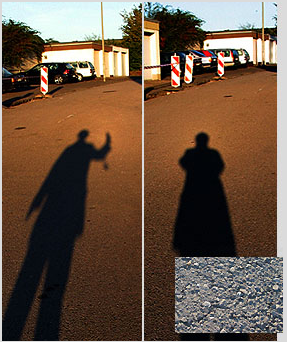Opposition effect on road surface
Opposition Effect on Road Surface: Exploring the Phenomenon
When we think of atmospheric optics, we often envision the stunning displays of rainbows, halos, and sundogs. However, there is another intriguing phenomenon that can occur on seemingly mundane surfaces like roads and beaches - the opposition effect. The opposition effect refers to the enhanced brightness and glow observed when viewing these surfaces from certain angles in relation to the light source, typically the sun. In this article, we will delve deeper into this captivating optical effect and explore its characteristics and possible explanations.
Unveiling the Subtle Glow
The opposition effect on road surfaces, as captured in Eva Seidenfaden's images, is particularly evident when the sun is positioned at a low angle. In the photographs, the worn road surface appears to have a layer of mud and small stones, likely remnants from nearby construction work. This unique combination of factors contributes to the manifestation of the opposition effect.
In one of the images, a distinct glow surrounds Eva's head, coinciding with the position of the camera's shadow. Conversely, when the camera is held away, the glow appears to move with its shadow. This behavior can be compared to the shadows observed on the Moon during astronaut Cernan's mission and to the phenomenon known as the "wet" heiligenschein.
The Elusive Nature of the Glow
The opposition effect on road surfaces is a subtle phenomenon that may not always be readily apparent. To observe it, one must carefully search for it by walking slowly or moving their head back and forth. It is not consistently present and can vary depending on various environmental factors. For instance, while exploring a nearby beach, the author once witnessed the opposition effect clearly in the sand. However, unfortunately, they were unable to capture the spectacle with a camera and have not encountered it again in that location.
The presence of the opposition effect seems to be linked to specific conditions. On the day the author observed it on the beach, the sand grains appeared to be arranged in tower-like structures, creating deep shadows within their interstices. This unique arrangement likely played a role in enhancing the opposition effect and creating the captivating glow.
Unraveling the Mystery
While the opposition effect on road surfaces and other similar environments is captivating, its underlying mechanisms are still not fully understood. However, scientists have proposed several explanations to shed light on this intriguing phenomenon:
- Shadow Focusing: One hypothesis suggests that the enhanced brightness observed during the opposition effect is due to the focusing of shadows in the surface irregularities. This focusing effect could amplify the amount of light reflected back to the observer, resulting in the glow.
- Shadow-Hiding: Another theory proposes that the opposition effect arises from the hiding of shadows within surface irregularities. When viewed from certain angles, these shadows become concealed, leading to an apparent increase in brightness.
- Specular Reflections: Specular reflections, which occur when light bounces off a smooth surface at a specific angle, may also contribute to the opposition effect. The alignment of the light source, observer, and surface can create optimal conditions for these reflections, intensifying the glow.
Further Observations and Research
The opposition effect on road surfaces and similar settings continues to captivate researchers and enthusiasts alike. While much progress has been made in understanding this phenomenon, there is still much to learn. Further observations and research are necessary to unravel its intricacies fully.
By conducting controlled experiments under various lighting conditions and surface textures, scientists can gain valuable insights into the underlying mechanisms behind the opposition effect. Advanced imaging techniques and simulations can also aid in visualizing and analyzing the intricate interplay of light and surface properties.
A Reminder of Nature's Complexity
The opposition effect on road surfaces serves as a reminder of nature's complexity and the myriad optical phenomena that can occur in our everyday surroundings. Even seemingly ordinary surfaces can exhibit extraordinary visual effects when viewed from the right angle and lighting conditions. By continuing to explore and study these phenomena, we deepen our understanding of the natural world and its many wonders.
As we venture forward, let us keep our eyes open to the subtle and captivating opposition effect, reminding ourselves that even in the most ordinary settings, there is often more than meets the eye.

Roads, beach sand and other surfaces sometimes show an opposition effect.
In these images, by Eva Seidenfaden (site), the sun was very low. The worn road surface had a layer of mud and small stones from nearby construction work.
In the right hand image the glow surrounds Eva's head where the camera's shadow is also situated. On the left the camera is held away and the glow moves with its shadow. Compare this to Cernan's shadow on the Moon and to that of the "wet" heiligenschein.
The glow is very subtle. When searching for it, walk slowly or move the head back and forth. It is not always there. I once saw it clearly in the sand of a nearby beach. Needless to say I did not have a camera and it has not (yet) appeared there again. On that day the sand grains must have been stacked in tower like structures which cast deep shadows into their interstices.
Note: this article has been automatically converted from the old site and may not appear as intended. You can find the original article here.
Reference Atmospheric Optics
If you use any of the definitions, information, or data presented on Atmospheric Optics, please copy the link or reference below to properly credit us as the reference source. Thank you!
-
<a href="https://atoptics.co.uk/blog/opposition-effect-on-road-surface/">Opposition effect on road surface</a>
-
"Opposition effect on road surface". Atmospheric Optics. Accessed on November 22, 2024. https://atoptics.co.uk/blog/opposition-effect-on-road-surface/.
-
"Opposition effect on road surface". Atmospheric Optics, https://atoptics.co.uk/blog/opposition-effect-on-road-surface/. Accessed 22 November, 2024
-
Opposition effect on road surface. Atmospheric Optics. Retrieved from https://atoptics.co.uk/blog/opposition-effect-on-road-surface/.